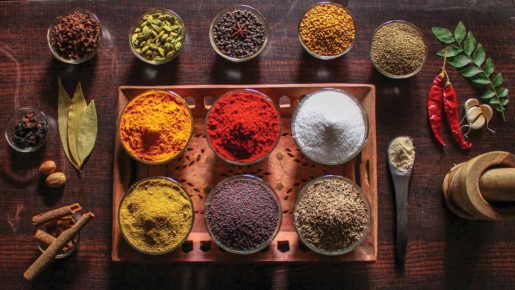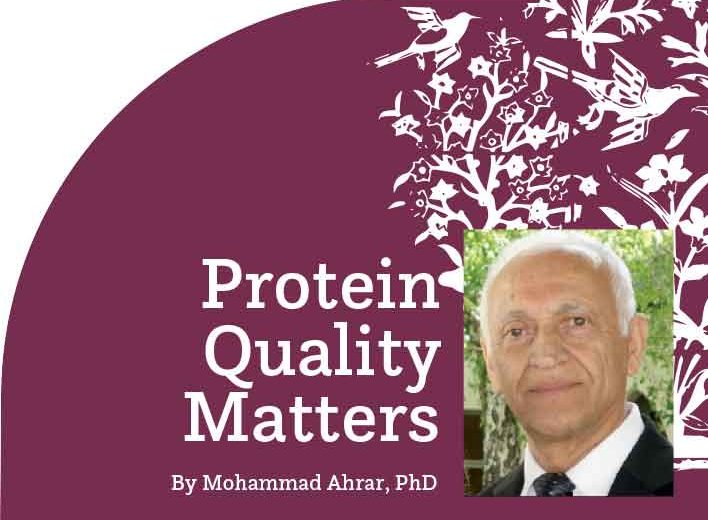The Science of Nutrition Health Benefits of Spices
By Mohammad Ahrar, PhD

Introduction
There are more than 100 common spices used in cooking around the world. Spices not only enhance the flavor, aroma, and color of food and beverages, but they can also have some health benefits due to their bioactive constituents such as flavonoids, polyphenols, and antioxidants. This article highlights potential health benefits of three commonly used spices.
Chili Peppers
Chili peppers are the fruits of a plant with the botanical name Capsicum annuum. The main bioactive compound in chili peppers—which is responsible for their unique, pungent, hot taste—is called capsaicin. This compound is mostly concentrated in the seed coat and dispersed in other parts of the fruit. Besides capsaicin, there are other chemicals in chili peppers that have powerful antioxidant properties. Capsanthin is the main carotenoid found in red chili peppers, violaxanthin is the carotenoid found in yellow chili peppers, and lutein is the most abundant carotenoid in green (immature) chili peppers.
Nutritional Value
Studies show that chili peppers are rich in various vitamins and minerals. They are high in vitamin C, a powerful antioxidant which is important for tissue repair and immune function. They also contain vitamin B6, which plays a role in energy metabolism; vitamin K1 (phylloquinone), which is essential for normal blood clotting, healthy bones, and kidney function; potassium, which reduces the risk of heart disease; copper, which is important for strong bones and healthy neurons; and other small amounts of major nutrients such as proteins, carbs, and fats.
Red chili peppers in particular are also high in beta carotene, which the body converts into vitamin A. Cayenne peppers and jalapeño peppers are varieties of chili peppers that exist in the market and have similar nutritional value. Powdered red chili pepper mixes are known as paprika. Because peppers are normally eaten in small amounts, their contribution to the daily intake is minuscule.
Uses
Besides the flavor and nutritional value of the chili pepper, it has been used for some medicinal purposes. Reports indicate that chilli peppers have been used as pain relief for headaches. When chili pepper is smelled (not recommended), the chemical capsaicin can numb the cranial trigeminal nerve from which some pain—such as that associated with migraine headaches—starts.
Health Benefits
Reports from the European Association for the Study of the Liver indicate that chili peppers hold the promise of preventing liver damage. Similar results were found in a study conducted at the International Liver Congress, which shows daily consumption of capsaicin, the active compound of chili peppers, has beneficial effects on liver damage.
Animal studies at Johns Hopkins University indicate that capsaicin helps reduce ulcers formed by ulcer-causing bacteria (Helicobacter pylori). The actual role of spices for protecting against the development of chronic diseases in humans needs additional research.
Cinnamon
Cinnamon is normally made from the inner bark of trees known as Cinnamomum camphora. The inner bark is finely ground and used in cooking and baking. Cinnamon can also be extracted from leaves, flowers, fruits, and roots of the cinnamon tree. There are different types of cinnamon—the darker-colored cassia cinnamon and the Ceylon cinnamon, also known as true cinnamon. Cassia cinnamon is a more common variety today, and it is what people generally refer to as “cinnamon.” The main active ingredient in cinnamon is cinnamaldehyde, which is responsible for its distinct smell and flavor. It may also be responsible for some of cinnamon’s possible health benefits.
Nutritional Value
Cinnamon does not provide enough of the major nutrients such as protein or fat and will not play a big role in your overall nutrition. However, a teaspoon of ground cinnamon does include small amounts of carbohydrates, fibers, calcium, beta carotene, and vitamin A.
Health Benefits
Cinnamon is a good source of polyphenols antioxidants, which are known for preventing body cells from oxidative damage caused by free radicals. Research suggests that cinnamon has anti-inflammatory properties and helps with stomach and intestinal problems. Cinnamon may also provide relief from indigestion, the common cold, diarrhea, poor blood circulation, and tension during menstruation. However, more scientific research is needed to substantiate those claims.
Cinnamon has been linked to a reduced risk of heart disease as it reduces levels of total cholesterol, LDL cholesterol, and triglycerides, while HDL cholesterol remains stable. Cinnamon also provides heart-healthy benefits, such as reducing high blood cholesterol and triglyceride levels. That is especially important for people with diabetes who are at greater risk for developing heart disease.
According to a Johns Hopkins report, cinnamon may be beneficial for some people who have high blood sugar. It lends a sweet taste to food without adding sugar and can lower blood sugar levels in people with Type 2 diabetes. Reports also show that cinnamon may be able to dramatically reduce insulin resistance. For people with Type 2 diabetes, 1 gram or about half a teaspoon of cinnamon per day has been shown to have beneficial effects on their blood markers. Cinnamon is not a replacement for diabetes medication or a carbohydrate-controlled diet, but it can be a helpful addition to a healthy lifestyle.
Cinnamon is normally consumed in very small amounts, so it is unlikely to cause any health problems. Heavy use of cinnamon, however, can irritate the mouth and lips, causing sores. Some people may even be allergic to it. Animal studies show that excess amounts of cassia cinnamon could be toxic, although its toxicity in humans is yet to be studied. Some experts suggest 1/2 to 1 teaspoon (2-4 grams) of cinnamon powder a day is enough to provide benefits without side effects. Given the lack of evidence about its safety, children, pregnant women, and women who are breastfeeding should avoid cinnamon as a treatment.
Turmeric
Turmeric is a spice that comes from the turmeric plant, belonging to the ginger family. Its rhizome (underground stem) is finely ground and used as a culinary spice and traditional medicine. Ground turmeric is a major ingredient in curry powder. When turmeric is combined with black pepper, the absorption of curcumin is increased drastically. Because turmeric is a fat-soluble powder, it is a good idea to have some fat in the diet when turmeric is consumed. The main use of this golden powder is for its color and flavor in traditional foods such as in Iranian dishes and Indian curries.
Nutritional Value
While turmeric contains small amounts of the major nutrients (proteins, carbs, and fats), plus minerals such as manganese, iron, potassium, and vitamin C, its main benefit is its powerful antioxidant properties.
Health Benefits
Turmeric contains compounds called curcuminoids, the most important of which is curcumin, the main active ingredient in turmeric. Curcumin is strongly anti-inflammatory, which can help fight chronic inflammation. Although acute, short-term inflammation is the body’s natural immune response, it can become a major problem when it becomes chronic. Scientists now believe that chronic inflammation plays a major role in heart disease, cancer, metabolic syndrome, Alzheimer’s disease, and various degenerative conditions. Therefore, anything that can help fight chronic inflammation is of potential importance in preventing and even treating these diseases.
Research suggests curcumin may reduce
inflammation in the brain which has been linked
to Alzheimer’s disease and depression.
Because of the anti-inflammatory qualities of curcumin, it may be effective for reducing pain and swelling of joints in people with arthritis. Turmeric is also used as a dietary supplement to treat inflammatory arthritis, as well as stomach, skin, liver, and gallbladder problems.
Oxidative damage of the cells and tissues is believed to be one of the mechanisms behind aging and many diseases; this damage involves free radicals that tend to negatively react to some important organic substances in the cells, such as fatty acids, proteins, and DNA. Curcumin is a potent antioxidant that can neutralize free radicals, and also stimulate the body’s own antioxidant defenses.
Studies show that many common brain disorders have been linked to decreased levels of a growth hormone-like substance in the brain. Curcumin can increase brain levels of this hormone-like substance which may be effective in delaying or even reversing many brain diseases and age-related diseases. It may also improve memory by increasing the growth of new neurons and fighting various degenerative processes; however, controlled studies in people are needed to confirm this. In another study, it was found that a combination of curcumin and a chemotherapy drug was more effective at shrinking drug-resistant tumors than using chemotherapy alone.
When it comes to heart disease, curcumin can play a major role in improving the function of the endothelium, the thin inner lining of blood vessels. It is well known that endothelial dysfunction is a major driver of heart disease, atherosclerosis, and the inability of the endothelium to regulate blood pressure, blood clotting, and various other factors. Several studies suggest that curcumin leads to improvements in endothelial function. In addition, curcumin reduces tissue inflammation and oxidation which play a role in heart disease. Preliminary studies found that curcuminoids from turmeric may reduce the number of heart attacks in patients who had bypass surgery.
Summary
Spices are mainly used for their coloring, flavor, and aroma in culinary and traditional diets. Most spices have antioxidant and anti-inflammatory properties which makes them useful for health purposes. Since the health benefits of spices are not proven by the government, it is always a good idea to consult with your physician before taking any spice as a supplement as they could affect the way antibiotics, diabetic drugs, blood thinners, and heart medicines work.
Selected sources
1- https://www.hopkinsmedicine.org/health/wellness
2- https://www.healthline.com/nutrition/10-proven-benefits-of-cinnamon#section2
3- https://www.healthline.com/nutrition/foods/chili-peppers
4- https://www.healthline.com/nutrition/foods/chili-peppers
6- https://www.webmd.com/diet/supplement-guide-cinnamon#1
7- https://www.medicalnewstoday.com/articles/306981


















